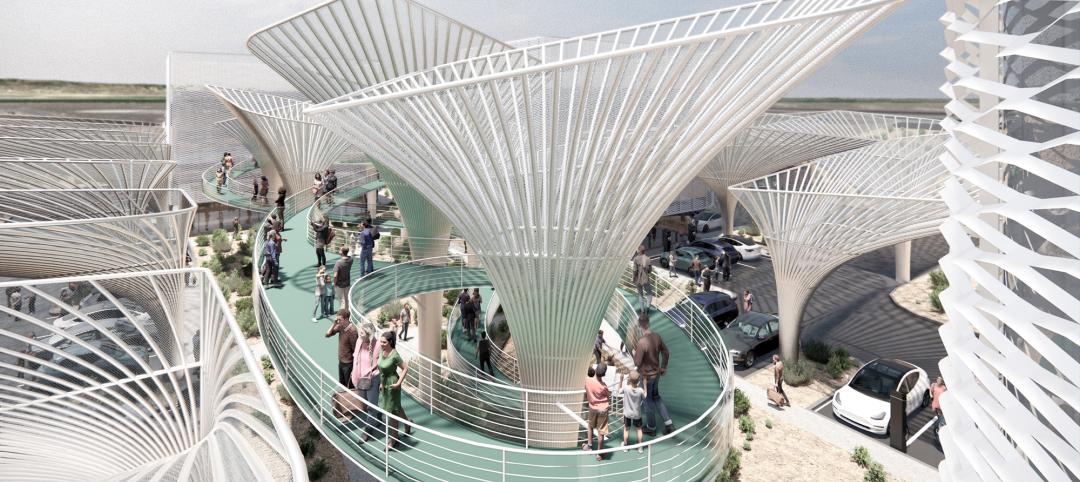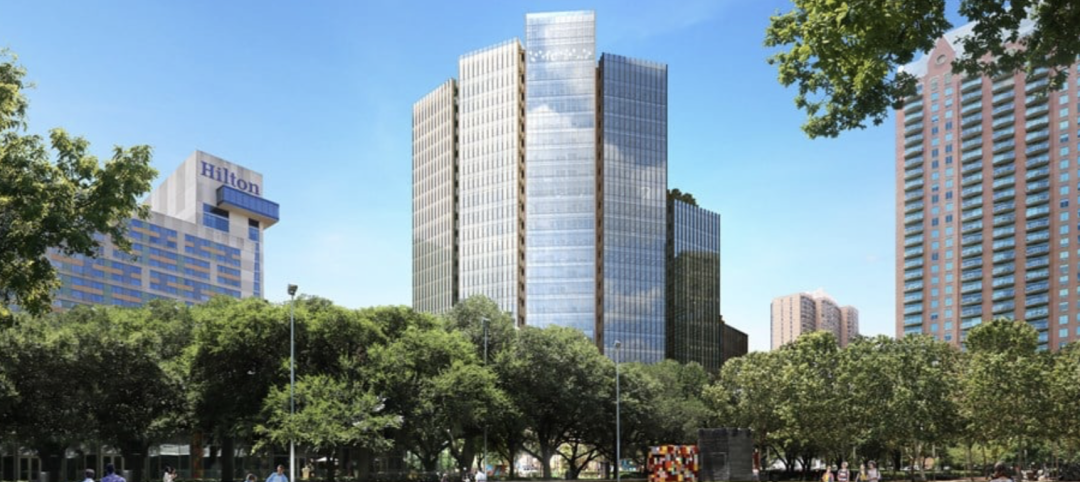The U.S. Green Building Council (USGBC) is pleased to announce New York and San Francisco as the recipients of the World Green Building Council's Government Leadership Awards for Excellence in City Policy for Green Building. Announced today at the United Nations Climate Change Conference in Durban, South Africa, the awards acknowledge international best practice in city-level government policy for green building initiatives and recognize green buildings as an important means to reduce carbon emissions.
Winners were chosen by an expert panel of judges comprised of ICLEI International, UN HABITAT and the WorldGBC.
"Buildings are responsible for approximately one-third of global carbon emissions and 40 percent of global energy usage, so the need for exemplary green building policies in the United States and throughout the world is great," said Rick Fedrizzi, president, CEO and founding chair, USGBC, and chair-elect of the World Green Building Council. "New York and San Francisco are strong models for green building policy. The United States continues to be at the forefront of the green building movement thanks in part to these shining examples of leadership."
San Francisco was honored with the Best Green Building Policy award for the San Francisco Green Building Ordinance, which requires all new commercial, residential and municipal construction to be built to the LEED green building program, and existing buildings to publicly disclose energy labels, undergo periodic energy audits and mandatory water efficiency retrofits at the time of sale. The impacts of building labeling and auditing alone are expected to reduce carbon dioxide emissions by 105,000 tons and have a 10-year net present value of approximately $1 billion. The city has also created financing options to assist the private sector in meeting its efficiency targets.
"San Francisco's innovative and comprehensive green building policies are lasting investments in the environmental and economic future of our great city," said Mayor Ed Lee. "The Green Building Ordinance employs San Francisco's design talent, as well as technological and business innovations, to ensure that we meet the market demands of the 21st century, protect the environment, and support the health and well being of our residents. Thank you to the many City staff, particularly at the Department of Building Inspection, Department of the Environment and the SF Public Utilities Commission, for their commitment to a sustainable city. I also wish to extend my appreciation to the local building industry professionals who design, construct and manage the green buildings for which we are receiving this award."
New York City received the Industry Transformation award for its Greener, Greater Buildings Plan, a component of the broader PLANYC policy that requires large commercial buildings to publicly display annual energy and water benchmarks and undergo cost-effective lighting and efficiency upgrades. The plan is expected to reduce the city's carbon dioxide emissions by 5.3 percent below 2009 levels, reduce citywide energy costs by $700 million annually by 2030 and create roughly 17,800 construction-related jobs over 10 years.
"We are honored to receive the Industry Transformation Award and also recognize the numerous private-public partnerships that made the plan's passage possible," said David Bragdon, director, New York City Mayor's Office of Long-Term Planning and Sustainability. "The Greener, Greater Buildings Plan will transform the industry because it is the first policy of its kind to aggressively target energy efficiency in large, existing buildings. We hope that this plan can be a model for other cities to follow because of the substantial environmental, economical, and social impacts that are possible on a large scale."
Other award recipients include Mexico City, Mexico; Birmingham, UK; Singapore; and Tokyo, Japan.
"Buildings represent unparalleled potential to reduce greenhouse gas emissions, and cities play a critical role in seizing this opportunity," said Jane Henley, CEO of the WorldGBC. "The Government Leadership Award entries demonstrate that all around the globe cities are implementing policies that are meeting immediate budget priorities while still addressing longer term emissions reduction goals. These cities are focusing on energy efficiency in the built environment to deliver a range of benefits, including operational savings, energy security, health and well-being to building occupants, and provide a much needed boost to the economy. We are pleased to recognize a select few for their drive and innovation." BD+C
Related Stories
Steel Buildings | Apr 6, 2023
2023 AISC Forge Prize winner envisions the gas station of the future
Forge Prize winner LVL (Level) Studio envisions a place where motorists can relax, work, play, shop, or perhaps even get healthcare while their vehicles charge.
Architects | Apr 6, 2023
New tool from Perkins&Will will make public health data more accessible to designers and architects
Called PRECEDE, the dashboard is an open-source tool developed by Perkins&Will that draws on federal data to identify and assess community health priorities within the U.S. by location. The firm was recently awarded a $30,000 ASID Foundation Grant to enhance the tool.
Architects | Apr 6, 2023
Design for belonging: An introduction to inclusive design
The foundation of modern, formalized inclusive design can be traced back to the Americans with Disabilities Act (ADA) in 1990. The movement has developed beyond the simple rules outlined by ADA regulations resulting in features like mothers’ rooms, prayer rooms, and inclusive restrooms.
Market Data | Apr 6, 2023
JLL’s 2023 Construction Outlook foresees growth tempered by cost increases
The easing of supply chain snags for some product categories, and the dispensing with global COVID measures, have returned the North American construction sector to a sense of normal. However, that return is proving to be complicated, with the construction industry remaining exceptionally busy at a time when labor and materials cost inflation continues to put pricing pressure on projects, leading to caution in anticipation of a possible downturn. That’s the prognosis of JLL’s just-released 2023 U.S. and Canada Construction Outlook.
Cladding and Facade Systems | Apr 5, 2023
Façade innovation: University of Stuttgart tests a ‘saturated building skin’ for lessening heat islands
HydroSKIN is a façade made with textiles that stores rainwater and uses it later to cool hot building exteriors. The façade innovation consists of an external, multilayered 3D textile that acts as a water collector and evaporator.
Market Data | Apr 4, 2023
Nonresidential construction spending up 0.4% in February 2023
National nonresidential construction spending increased 0.4% in February, according to an Associated Builders and Contractors analysis of data published by the U.S. Census Bureau. On a seasonally adjusted annualized basis, nonresidential spending totaled $982.2 billion for the month, up 16.8% from the previous year.
Sustainability | Apr 4, 2023
ASHRAE releases Building Performance Standards Guide
Building Performance Standards (BPS): A Technical Resource Guide was created to provide a technical basis for policymakers, building owners, practitioners and other stakeholders interested in developing and implementing a BPS policy. The publication is the first in a series of seven guidebooks by ASHRAE on building decarbonization.
Sustainability | Apr 4, 2023
NIBS report: Decarbonizing the U.S. building sector will require massive, coordinated effort
Decarbonizing the building sector will require a massive, strategic, and coordinated effort by the public and private sectors, according to a report by the National Institute of Building Sciences (NIBS).
Education Facilities | Apr 3, 2023
Oklahoma’s Francis Tuttle Technology Center opens academic center for affordable education and training
Oklahoma’s Francis Tuttle Technology Center, which provides career-specific training to adults and high school students, has completed its Francis Tuttle Danforth Campus—a two-story, 155,000-sf academic building. The project aims to fill the growing community’s rising demand for affordable education and training.
Sports and Recreational Facilities | Mar 30, 2023
New University of St. Thomas sports arena will support school's move to Division I athletics
The University of St. Thomas in Saint Paul, Minn., last year became the first Division III institution in the modern NCAA to transition directly to Division I. Plans for a new multipurpose sports arena on campus will support that move.

















